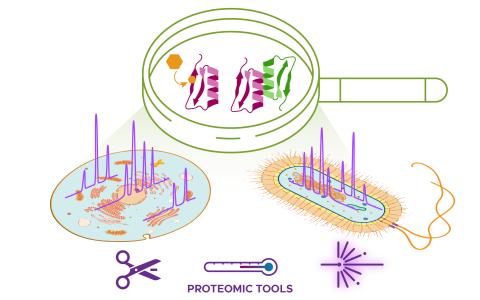Description
Created on 2024-10-16T17:27:40+00:00 by LN Anderson; Last updated 2025-08-01T15:13:46+00:00.
S. elongatus PCC 7942 LiP and TPP Structural Proteomics (JM-PB-DP3)
The purpose of this experiment was to investigate structural alterations in proteins involved in central carbon metabolism and photosynthetic electron transfer pathways in Synechococcus elongatus PCC 7942. Sample data was obtained from S. elongatus cell lysates using three complementary mass spectrometry (MS) techniques using limited proteolysis (LiP-MS), thermal proteome profiling (TPP-MS), and redox enrichment (Redox-MS) in evaluating alterations solvent accessibility and structural stability caused by light perturbation at the molecular level. Experimentally processed sample data for LiP and TPP proteomic datasets were derived from the same cell culture stock, prepared simultaneously in parallel, and acquired by mass spectrometry (see details below).
Experimental Methods
- LiP-MS-Opt - Sample data was obtained from S. elongatus PCC 7942 cell lysates treated with different non-specific proteases (1:200 or 1:500 enzyme:substrate ratio) and prepared using limited proteolysis by mass spectrometry (LiP-MS) for experimental optimization of non-specific digestion protocol. Tested proteases include: Proteinase K, Ficin, Thermolysin, Pronase, and/or Trypsin only.
- LiP-MS-Pro - Sample data was obtained from S. elongatus PCC 7942 cell lysates treated with pronase (1:200 enzyme:substrate ratio in addition to double digest using trypsin) and prepared using limited proteolysis by mass spectrometry (LiP-MS) for Label-free quantification (LFQ) proteomic analysis.
- TPP-MS-TMT10 - Sample data was obtained from S. elongatus PCC 7942 cell lysates treated across 10 temperatures (37 – 82 ºC in 5 ºC increments, prepared using thermal proteome profiling by mass spectrometry (TPP-MS), and fractionated for TMT10 proteomic analysis.
- Redox-MS-TMT16 - Sample data was obtained and reanalyzed from a previously reported data package MC-DP2. See linked dataset below for additional experimental metadata information.
Accessible Digital Data Downloads*
Processed datasets are openly accessible from the download button and contain secondary processed proteomic results files, computed outputs, and supporting metadata materials. Experimental samples processed for LiP-MS label-free quantification (LFQ) or TPP-MS tandem mass tag (TMT) 10-plex were acquired using a Q-Exactive HF-X mass spectrometer and processed/compiled using either MSGF+ (v2024.03.26) or PlexedPiper for proteome evaluation. Additional software supporting downstream proteomic analysis include FragPipe (v.4.0), MSFragger (v.22.1), and an adapted Microbial Isolate LiP Analysis Workflow (located at Zenodo). Processed proteomic data downloads include a sample naming key, normalized quantification results files, and processed protein annotated abundance files.
*Corresponding primary publication is under review.
Linked Primary Data
Primary liquid chromatography-mass spectrometry (LC-MS) raw measurement data are openly accessible for download at the Mass Spectrometry Interactive Virtual Environment (MassIVE) community repository under the following accessions:
- MassIVE Accession: MSV000098675 (LiP-MS-Opt)
- MassIVE Accession: MSV000098676 (LiP-MS-Pro)
- MassIVE Accession: MSV000098679 (TPP-MS-TMT10)
Previously Reported
- MassIVE Accession: MSV000096184 (Redox-MS-TMT16, previously reported under "MC-DP2")
Funding Acknowledgments
The research data described here was funded in whole or in part by the Predictive Phenomics Initiative (PPI) at Pacific Northwest National Laboratory (PNNL). This work was conducted under the Laboratory Directed Research and Development Program at PNNL. A portion of this research was performed in the Environmental Molecular Sciences Laboratory, a national scientific user facility sponsored by the U.S. Department of Energy (DOE) Office of Science located at PNNL. PNNL is a multiprogram national laboratory operated by Battelle for the DOE under Contract No. DE-AC05-76RL01830.
Citation Policy
In efforts to enable discovery, reproducibility, and reuse of PPI-funded project dataset citations in accordance with best practices (as outlined by the FORCE11 Data Citation Principles), we ask that all reuse of project data and metadata download materials acknowledge all primary and secondary dataset citations and corresponding journal articles where applicable.
Data Licensing





